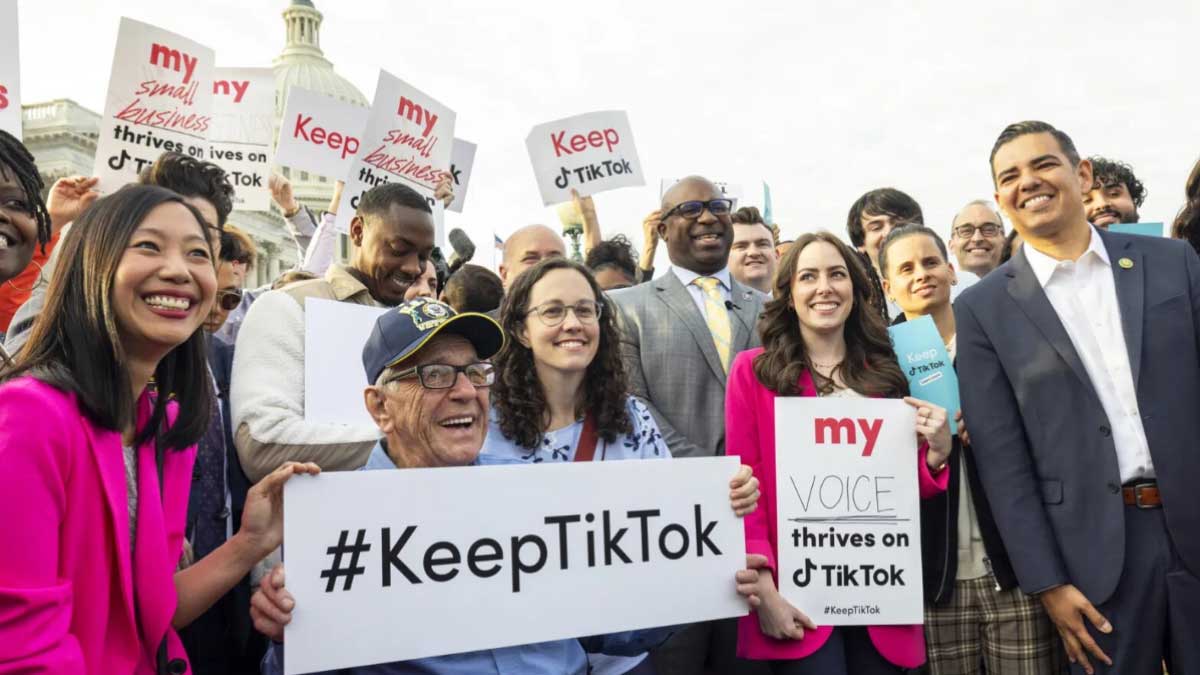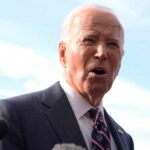- Home
- Billionaires
- Investing Newsletters
- 193CC 1000
- Article Layout 2
- Article Layout 3
- Article Layout 4
- Article Layout 5
- Article Layout 6
- Article Layout 7
- Article Layout 8
- Article Layout 9
- Article Layout 10
- Article Layout 11
- Article Layout 12
- Article Layout 13
- Article Layout 14
- Article Sidebar
- Post Format
- pages
- Archive Layouts
- Post Gallery
- Post Video Background
- Post Review
- Sponsored Post
- Leadership
- Business
- Money
- Small Business
- Innovation
- Shop
Recent Posts
TikTok Ban Faces Critical Court Hearing as Legal Battle Intensifies

A panel of federal judges will hear TikTok’s challenge to a federal law threatening to ban the app in the U.S., marking a significant moment in the legal battle over TikTok’s future. This hearing, scheduled for Monday, is pivotal in the ongoing dispute between TikTok and the U.S. government, with the outcome likely setting the stage for a Supreme Court showdown before a potential ban or forced sale of the app takes effect in January 2024. At the heart of the case is the Protecting Americans from Foreign Adversary Controlled Applications Act, which mandates TikTok’s separation from its China-based parent company ByteDance or face a nationwide ban.
The U.S. Court of Appeals for the D.C. Circuit will be the forum where TikTok argues that the Act violates its constitutional rights, particularly its First Amendment protections. TikTok contends that the ban infringes on freedom of speech and that the law’s 270-day deadline for ByteDance to divest from the company is both arbitrary and technologically infeasible. Should TikTok fail to convince the court to block the legislation, the app could be removed from U.S. app stores by January 19, 2024.
TikTok’s legal team asserts that separating from ByteDance would cripple the app’s operations in the U.S., turning it into a shadow of its current self. They argue that divesting from its parent company is neither technologically nor commercially viable, especially under the current 270-day deadline. If forced to comply, TikTok claims it would lose access to the innovative algorithms that personalize content for users, effectively diminishing the user experience and stifling its growth. According to the company’s brief, these restrictions would fundamentally damage its business and limit its ability to operate as a platform for free expression.
The federal government, however, maintains that ByteDance’s ties to China pose a grave national security risk. The government argues that the Chinese ownership of TikTok enables the potential for data collection and surveillance on a massive scale, though much of the intelligence supporting this claim remains classified. In court filings, the government highlighted the potential for TikTok to be exploited by the Chinese government for espionage or influence operations, particularly given China’s laws requiring companies to cooperate with state intelligence agencies. While these concerns have fueled bipartisan support for the legislation, critics, including TikTok, argue that the government’s case is built on speculation rather than concrete evidence of wrongdoing.
TikTok’s lawsuit isn’t the only legal challenge being considered. Several TikTok creators have also filed suits, arguing that banning the app would stifle their businesses and infringe on their rights to free speech. Many creators rely on TikTok to promote their work and engage with audiences, making the potential ban a significant threat to their livelihoods. The creators contend that a ban would disproportionately impact their ability to communicate, collaborate, and generate income in ways that other platforms cannot replicate.
While the legal arguments continue to unfold, both sides have urged the court to issue a ruling by December 6, 2023. No matter the outcome of Monday’s hearing, the case is expected to be appealed to the Supreme Court, which would ultimately decide whether TikTok can continue operating in the U.S. This means that the app’s fate will remain uncertain for months, even as the January 19 deadline looms.
A significant question remains about how the court will rule. The panel of judges overseeing the case was appointed by Presidents Barack Obama, Ronald Reagan, and Donald Trump—suggesting a possible tilt toward government arguments. However, TikTok has seen favorable rulings in past cases where its legality was challenged, adding an element of unpredictability to the proceedings. Moreover, the government’s decision to keep much of its evidence under seal complicates the situation. Even TikTok is unaware of the full scope of the intelligence the government is using to justify its case, leaving the company with little insight into the precise national security concerns the U.S. government has about its operations.
The origins of this legal battle date back to the Trump administration, which attempted to ban TikTok in 2020 via executive order, citing national security threats. That effort was ultimately blocked in court. Since then, concerns about TikTok’s operations have continued to grow, leading to the passage of the current law in April 2023, which was signed by President Joe Biden after receiving strong bipartisan support in Congress. The law arrived amid heightened scrutiny over TikTok’s potential misuse of user data, including allegations that it spied on journalists, manipulated content, and promoted Chinese propaganda.
TikTok has repeatedly denied any involvement with the Chinese government and dismissed many of the accusations as unfounded. In its defense, the company claims that its operations in the U.S. are handled independently of ByteDance and that user data is stored on servers outside of China. TikTok also argues that any potential security risks could be addressed through less drastic measures, such as enhanced data protections, rather than a total ban.
The federal government, however, stands firm in its position. In its lawsuit, the government argues that the TikTok ban does not violate First Amendment rights, as the law targets specific national security concerns rather than the suppression of speech. Moreover, the government asserts that TikTok creators still have other platforms to share their content, making any claims about free speech violations unfounded.
One of the government’s central arguments is that the TikTok ban is necessary to safeguard U.S. national security. In its legal brief, the government emphasized the serious threat posed by TikTok, stating that the company’s ties to a “hostile foreign power” justify the ban. The government also dismissed claims that the ban would unfairly target TikTok over other platforms, contending that the app’s unique risks necessitate a different approach.
The stakes are high for TikTok, with 170 million users in the U.S. alone. The company has cited its positive impact on the economy, claiming that it contributed $8.5 billion to the U.S. GDP in 2022. In addition, TikTok has positioned itself as a vital platform for small businesses, helping them boost sales by nearly $15 billion in 2023, according to a study commissioned by the company.
Despite the looming threat of a ban, TikTok remains a crucial tool for political campaigns, including those of Vice President Kamala Harris and former President Donald Trump. Both have significant followings on the platform, using it as a key way to engage voters ahead of the 2024 presidential election. This reliance on TikTok underscores the app’s cultural and political significance, adding yet another layer of complexity to the debate over its future.
Recent Posts
Categories
- 193cc Digital Assets2
- 5G1
- Aerospace & Defense46
- AI37
- Arts3
- Banking & Insurance11
- Big Data3
- Billionaires449
- Boats & Planes1
- Business328
- Careers13
- Cars & Bikes76
- CEO Network1
- CFO Network17
- CHRO Network1
- CIO Network1
- Cloud10
- CMO Network18
- Commercial Real Estate7
- Consultant1
- Consumer Tech180
- CxO1
- Cybersecurity68
- Dining1
- Diversity, Equity & Inclusion4
- Education7
- Energy8
- Enterprise Tech29
- Events11
- Fintech1
- Food & Drink2
- Franchises1
- Freelance1
- Future Of Work2
- Games141
- GIG1
- Healthcare78
- Hollywood & Entertainment186
- Houses1
- Innovation42
- Investing2
- Investing Newsletters4
- Leadership65
- Lifestyle11
- Manufacturing1
- Markets20
- Media193
- Mobile phone1
- Money13
- Personal Finance2
- Policy567
- Real Estate1
- Research6
- Retail1
- Retirement1
- Small Business1
- SportsMoney33
- Style & Beauty1
- Success Income1
- Taxes2
- Travel10
- Uncategorized8
- Vices1
- Watches & Jewelry2
- world's billionaires418
Related Articles
Trump Moves $4B Stake in Truth Social Parent, Stock Drops 6%
Donald Trump recently transferred his 57% stake in Trump Media & Technology...
By 193cc Agency CouncilDecember 20, 2024House Rejects Trump-Backed Funding Bill, Shutdown Looms
The U.S. House of Representatives rejected a new government funding bill on...
By 193cc Agency CouncilDecember 20, 2024Trump Named Time’s Person of the Year for Second Time
On Thursday, Time magazine honored Donald Trump as its “Person of the...
By 193cc Agency CouncilDecember 12, 2024Meta Donates $1 Million to Trump’s Inaugural Fund
Meta, the parent company of Facebook and Instagram, has confirmed a $1...
By 193cc Agency CouncilDecember 12, 2024















Leave a comment